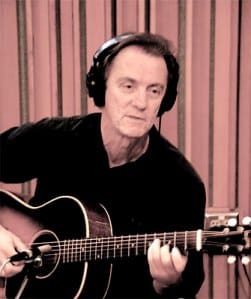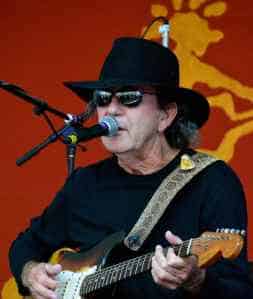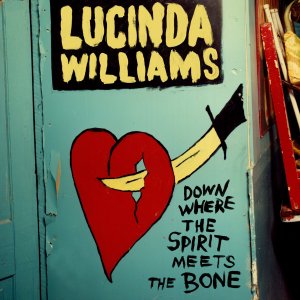Lucinda Williams: Confident & In Control (Interview)
35 years into her career, Lucinda Williams shows no signs of slowing down. In fact, she’s more productive than ever. Her latest album, Down Where The Spirit Meets The Bone is a double disc set featuring 20 new songs. And as it turns out, there’s more where those came from. That’s what The 13th Floor’s Marty Duda found out when he spoke to Lucinda recently. By starting her own record label and producing herself, Lucinda Williams has taken control of her music and how its presented, leaving her in a very good space.
Click here to listen to the interview with Lucinda Williams:
Or, read a transcription of the interview here:
MD: Congratulations on the new album first of all, I’m loving it.
LW: Thank you.
MD: I was especially excited because I saw that you had Greg Leisz on co-producing chores on the record along with you and Tom and I’ve always loved kinda everything he’s involved with. So anytime I see his name on a record, in the credits I figure we’re in for some good stuff.
LW: Yeah.
MD: But I don’t think I’ve seen his name as a producer before. So I was wondering what prompted you to have him co-produce the album with you guys.
LW: Yeah. Well he came in, initially we brought him in, you know, to play on the album and he proved to just be indispensable as far as coming up with production ideas and all of this. It just kind of gradually evolved into, you know, kind of a teamwork thing and it just really, you know, just organically just kind of just felt right. So Tom and I talked about it and I said I think we should, you know, make Greg an official co-producer.

MD: Right.
LW: And it just felt real natural. You know, I was really glad to have him involved and be in that role.
MD: Right and it seems like there’s quite a bit of guitar on the record. Usually every track has Greg and someone else, whether it’s Stuart Mathis or Bill Frisell or Doug Pettibone or somebody kind of duelling it out In the middle of a song. Was that something that’s planned ahead of time or did it just kind of happen?
LW: Well I love guitar, you know, I love guitar, guitar sounds and, you know, all of that and, you know, I was really blessed to have access to all these great different guitar players, they all have their own unique sound and, you know, we just talked it out who would be good for a particular song and. You know, Greg was kind of…that’s one reason he got more involved because he pretty much needed, we needed him on everything, you know, cause’ usually we would have two guitar, you know, we’d have a lead guitar and then somebody else would be playing rhythm or you know, Greg would be playing pedal steel or whatever it is. You know, and Greg has, he kind of provided the glue, he just kind of was able to just kind of help direct the other musicians and that kind of thing.
MD: And of course one guy who’s sitting in on a couple of tracks is Tony Joe White.
LW: Yeah.
MD: Who is fantastic. Do you and he go back aways or how did you manage to get him?
LW: Well I met him, we got to be friends when I was living in Nashville in the 90s and I sang on one of his albums several years ago and when we were recording he happened to be in Los Angeles performing. So we went to the show and we talked to him and asked him if he could stay over a couple of extra days and come in the studio and he said yeah. So we bought him in, he was just, you know, we just turned on the mic and just let him go, you know.

MD: Sure.
LW: I mean that’s the thing with working with this, you know, the calibre of musicians, you know, you don’t really have to tell them very much.
MD: Right, right. Yeah I mean you kinda feel that, especially with Tony Joe White, the stuff just pours out of him and it sounds like him and that’s what he does and it’s fantastic, so.
LW: And that’s it, yeah.
MD: We’ve been kinda lucky here in Auckland, there’s been a venue in town that’s put on this Americana festival. We’ve had folks like Ryan Bingham and Robert Ellis and Nikki Lane, I think tomorrow night Justin Townes Earle is in town and Willy Vlautin from Richmond Fontaine. Do you, are you familiar with many of those artists? Do you feel kind of a kinship with what they’re doing?
LW: Yeah, yeah.
MD: And, cause’ you’re kind of, you would fit right in there. Are you planning to head out to this part of the world at all? I know you’ve been here plenty of times.
LW: Oh yeah. Yeah, we’re planning an Australian and New Zealand tour and yeah, you know, probably in the spring.
MD: Right, right, excellent, that’s good news. I was curious, you know, the new album with 20 tracks, a double album, would that have been possible if you hadn’t been your own record label at that point? If you had been signed to someone else would there have been reluctance to allow you to put out a double album at this point in your career?
LW: Yeah, probably because I tried to do that actually a few years ago when the West album came out. At that time I had enough songs for a double album and I wanted that to be a double album but I was on Lost Highway and, you know, they didn’t want to do that. Yeah most labels don’t, you know, most major labels don’t really like the idea of a double album cause’ I think, you know, they’re afraid it’ll affect the record sales and all of that. I guess it can be kind of a risky endeavour at times but when it works, it’s great. You know, there have been some great ones, Bob Dylan’s Blonde on Blonde.
MD: Yeah. You can’t argue with that, that’s for sure.
LW: Yeah. The Allman Brothers Live At The Fillmore East and you know.
MD: Well even recently Jeff Tweedy, you know, put out his double album and Prince put out two albums at the same time around. So there seems to be something that’s kinda going around these days.
LW: Yeah.
MD: And I assume that the reason for the double album is just that you had so many great songs to choose from. It seems like you always have a lot of songs around. Have you ever had a problem, a dry patch, where writing was a problem for you?
LW: I’m going through that, you know, it’s been a while but I think, you know, the older I get and the more I’m writing, it seems to become easier for me. We actually recorded about 30 tracks.
MD: Right.
LW: So we have another album in the can already.
MD: That’s fantastic.
LW: Yeah. So and I’ve got a handful of songs now that I’ve started before and that aren’t quite finished yet, so yeah. I’m in a good place creatively right now.
 MD: It sounds like it. That’s amazing that you have so much stuff happening. Thinking about that, it seems like people, especially with you, seem to try and draw parallels between your music and your personal like and kind of create this narrative, you know, based on what they hear in your songs and what they think is going on. Is that something that you’ve noticed and does that effect you at all?
MD: It sounds like it. That’s amazing that you have so much stuff happening. Thinking about that, it seems like people, especially with you, seem to try and draw parallels between your music and your personal like and kind of create this narrative, you know, based on what they hear in your songs and what they think is going on. Is that something that you’ve noticed and does that effect you at all?
LW: Well I mean, you know, I’d write for my own perspective and all and a lot of the songs are about my personal life, I mean, they all really are. I mean even if I’m writing about something about somebody else, you know, I’m still, kind of, I have to be able to understand the situation, you know.
MD: Right, right. Yeah.
LW: But, yeah. No it doesn’t bother me that, you know… I’m not sure what the question was exactly.
MD: Well I guess people try to read in things into what, you know, why you’ve written the song or what, you know, are you happy, are you unhappy, you know.
LW: Yeah. Well sometimes I’m happy, sometimes I’m unhappy.
MD: Fair enough.
LW: I mean, yeah.
MD: And getting back to the songs on the album. The album opens with, Compassion and again I was thinking, when I first heard that opening track that if it had been out on a major label or a label other than your own, there probably would have be resistance to have that as the first song on the album. Was there a specific reason why you wanted that to be the first thing folks heard?
LW: Yeah, well and you’re right. I mean, that probably wouldn’t have happened, you know, most usually people put a solo song like that the very end.
MD: Right, yeah.
LW: Which was our first inclination but Greg Leisz is actually who suggested it, thought it would be a good idea to put it first and everybody seemed to agree. So, you know, I wasn’t sure to tell you the truth that, that was the right thing but, you know, we kinda, we took a chance and went ahead with it. It seems that it’s proven to be a good idea because it’s really grabbed people.
MD: Right.
LW: And, you know, Greg was saying, he said, you know, I think if we put it anywhere else on the record, it’s gonna kinda get lost.
MD: Yeah. It’d be weird, especially in the middle of the record somewhere I think, yeah.
LW: Yeah, yeah, so.
MD: It kinda has to have its own place.
LW: Yeah, yeah. We broke a few rules this time around, you know, like that, that’s one of them and the double album thing and the songs, you know, the 10 minute length songs or whatever it is.
MD: Yeah you got Magnolia going on for 10 minutes which was, you know, I looked at, I thought it was, maybe one of those trick hidden track things where the song went on really for 5 minutes and then there was silence and another song would come up until I heard it. But, yeah, how did that evolve into, you know, it’s a J.J Cale song that went on for that long, was it just…?
LW: Well again that was the guys just doing their thing. I mean, you know, it was very spontaneous, we didn’t talk about it or plan it or anything, it just evolved into that.
MD: Is making records easier now and more satisfying than it was, say 15, 20 years ago for you?
LW: Yeah, absolutely. Yeah, cause’ I’m more in control now and I’m a lot more confident. I mean, I still get worried and nervous sometimes about things that, you know, I think that’s pretty common and, you know, like I want it to sound right, I want it sound good but, you know, I surround myself now with people who, you know, support my ideas and, you know. I have the freedom to, you know, if I wanted to try something out I can do that, you know.
MD: And I guess that must come with the fact that you’ve been doing it long enough now that you can get in that position where as if you’ve got just one or two records under your belt, people seem to think that they know what’s better for you I guess.
LW: Yeah, yeah and everybody works differently in the studio, you know, I mean, you know, maybe some artists kind of liked to be more produced you know by somebody else or, you know.
MD: Yeah.
LW: Whereas I like to be, I’m very hands on, I like to be involved with the whole process, even throughout the art work in the album cover and everything, you know.
MD: And vocally, I don’t know how you record. Do you lay down the instrumental tracks first and then sing over top of them? I imagine that must be probably the case. Are you thinking about…?
LW: No.
MD: No?
LW: I’m singing with the band, yeah. We’re cutting it all, yeah. I mean I’m separated in the vocal booth.
MD: Sure.
LW: You know, but the guys are all in a room together and I’m separated but I can see all of them. You know, and yeah that’s how we cut everything.
MD: So that must have an effect on how they’re playing and how you’re singing if…
LW: Oh yeah, yeah. You know, that’s why it feels so natural and everything, you know, we have some of those endings like that, cause’ it’s just like everybody are just sitting around playing, I mean, you know.
MD: Yeah and when you’re touring. Is it Stuart Mathis playing guitar in your band when you’re on the road?
LW: Yeah, yeah. He’s gonna be on the road with us all this year.
MD: Excellent.
LW: And hopefully next year. Yeah he’s from the band The Wallflowers.
MD: Right and I see Jakob Dylan in there as well.
LW: Yeah, yeah. But they’re kind of on hiatus now. So Stuart’s available so, you know, he’s great.
Click here to read The 13th Floor review of Down Where The Spirit Meets The Bone.
- Challengers – Dir: Luca Guadagnino (Film Review) - April 24, 2024
- Civil War – Dir: Alex Garland (Film Review) - April 9, 2024
- Pearl Jam – Dark Matter (Monkeywrench/Republic) Album Review - April 1, 2024

November 4, 2014 @ 10:27 am
YeeeHaaa… Can’t wait! Autumn cannot come quick enough!!
*Paul Richards* Nutshell Rentals
+64- *9 3789-555*
+64 – *21 959-555*
PO Box 4207 400B Great North Road
Auckland 1040 Grey Lynn 1021
New Zealand Auckland
Skype: paulrichards94
Website: http://www.nutshellrentals.tv
Like: facebook.com/NutshellCameraRentals
*This email and any files transmitted with it are confidential and intended solely for the use of the individual or entity to whom they are addressed. It may not be disclosed, copied or distributed in any form without the express permission of Nutshell Productions Ltd.*